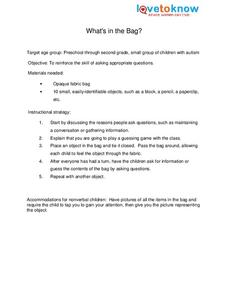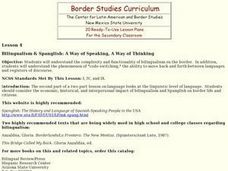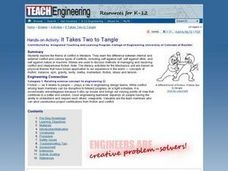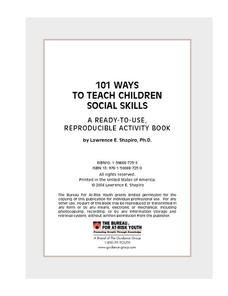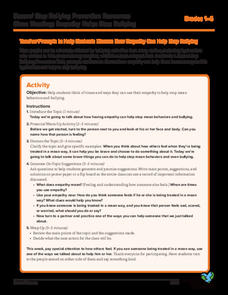Curated OER
Red Stoplight Personal Space Game
I really like this activity. Learners with special needs play a stoplight game to practice giving and responding to the need for personal space. Each child is given a green light and red light card, when you say, "Go" they walk around...
Curated OER
Advanced Spelling: Friendship
Secondary learners unscramble vocabulary terms associated with friendship and interpersonal relationships. The 13-question activity could be used with middle schoolers or older ELLs. High level vocabulary included!
Curated OER
What's in the Bag?
Practice interpersonal communication with your young learners with autism. They play a game to practice asking appropriate questions. They each take turns asking, "What's in the bag?" Additionally, they discuss reasons for asking...
Curated OER
Self-Portrait
Build a sense of self while honing prewriting and fine motor skills by having your learners with autism draw a self-portrait. The lesson is intended for younger pupils but could be used with learners of any age in need of motor and...
California Department of Education
I Have “M.I.” Strengths!
There are so many ways to be smart! Can your class identify their intelligences? The third of five career and college lesson plans designed for sixth graders challenges them to assess their unique skills. Once they determine their...
Curated OER
GREETINGS AND LEAVE TAKINGS
Students respond with memorized answers to questions that use familiar language. They ask basic memorized questions and imitate sounds and words with age- and stage- appropriate pronunciation. They Use the appropriate interpersonal...
Curated OER
Bilinguilism and Spanglish: A Way of Speaking, a Way of Thinking
Learners compare the differences between bilingualism and registers of discourse. They investigate how economic, historical and interpersonal relationships affect language and relationships.
Curated OER
It Takes Two To Tangle
Learners utilize strategies to comprehend literature. They write stories with diverse vocablulary that incorporate the difference between internal and external conflict. They make sure that the stories use methods of managing and...
Missouri Department of Elementary
Relationships…Quality Control
Quality relationships don't just happen. They require nurturing, patience, thoughtful communication, and honesty. Help tweens develop these relationship skills with an activity that asks them to themselves and then outline a...
Curated OER
Sculpture: Exploring Pop Art: Creating
Learners work in teams to create collaborative sculptures of food. They are required to create the food, dishes, and utensils needed to display their work. Note: This is a team building and design exercise.
Guidance Group
101 Ways to Teach Children Social Skills
Increasing pressure to improve student achievement has made it easy to overlook the social skills they also need to develop. With this collection of worksheets and activities, you'll be able to improve children's communication, teamwork,...
Centre for Clinical Interventions
Social Skills Treatment Programme
Even though they may not be tested on standardized assessments, social skills are vital for students to develop during their years in school. Through a series of discussions, activities, and role-playing exercises, these lessons teach...
Macmillan Education
Teamwork
Learners develop self-awareness and discuss the importance of cooperation and communication through worksheets and hands-on, collaborative activities.
Macmillan Education
Communicate/Cooperate
Prepare pupils to communicate effectively throughout their lives with this set of worksheets and activities, which are part of a 23-lesson series on valuable life skills. Class members will define communication and cooperation, discuss...
US Institute of Peace
Observing Conflict
Can your class manage conflict? Give them the tools they need to succeed at conflict resolution with the third lesson in a 15-part series of peacebuilding activities. Learners draw from personal conflict experience as they analyze...
US Institute of Peace
Responding to Conflict: Nonverbal Communication
What does your posture say about you? How can it affect the outcome of conflict resolution or negotiation? Show scholars the importance of nonverbal communication during the sixth in a series of 15 peacebuilding lessons. Learners work...
US Institute of Peace
Responding to Conflict: Negotiation—Identifying Wants and Needs
Let's make a deal! Are real negotiations as simple as they are in the game show? Scholars learn the art of negotiation during the 8th instructional activity in a series of 15. The activity kicks off with a fun group negotiation, then...
US Institute of Peace
The Process of Negotiation
What does it take to be a great negotiator? Learners discover the factors that affect the negotiation process through group discussion and brainstorming. An installment in a series of peacebuilding activities compares the needs and wants...
California Department of Education
Etiquette? What’s That?
Business etiquette is a big deal! Are your scholars prepared to impress in the business world? The third in a series of six college and career readiness lessons focuses on basic behaviors in business situations. Groups research specific...
The Holler
Conflict Resolution
Does your class understand the importance of peaceful conflict resolution? Middle schoolers share conflict stories, then collaborate to resolve simulated conflicts during an engaging lesson plan. The teacher's guide contains...
Franklin Covey
The Habits of Highly Effective Teens
Sally and Joe both want the last cookie in the jar, so they split it in half. That's an example of a win-win situation, one of the many principles Sean Covey outlines in his book The 7 Habits of Highly Effective Teens. Using the...
New Brunswick Department of Education
Personal Development And Career Planning Curriculum Grade 9/10
What is the difference between a proactive person and a reactive person? Scholars explore the topic, and many others, with helpful lessons, discussions, role play activities, and games. Each activity supports one of the key principles...
Missouri Department of Elementary
How Does a Friend Act?
Two puppets showcase social skills while scholars decide whether their actions are positive or negative. Learners take turns with the puppets, acting out scenarios with a peer while the rest of the class decide if they're being a good...
Committee for Children
Class Meeting: Empathy Helps Stop Bullying
A lesson instills the importance of how empathy has the ability to aid in stopping bullying behavior. Scholars discuss, in-depth, a series of three questions. Using class input, an anchor chart is made then displayed for reference.
Other popular searches
- Interpersonal Relationships
- Interpersonal Skills
- Interpersonal Skills Games
- Interpersonal Space
- Interpersonal Activities
- Interpersonal Effectiveness
- Interpersonal Strategies
- Interpersonal Communications
- Health Interpersonal Skills
- Interpersonal Conflict
- Nonverbal Interpersonal
- Interpersonal Model




